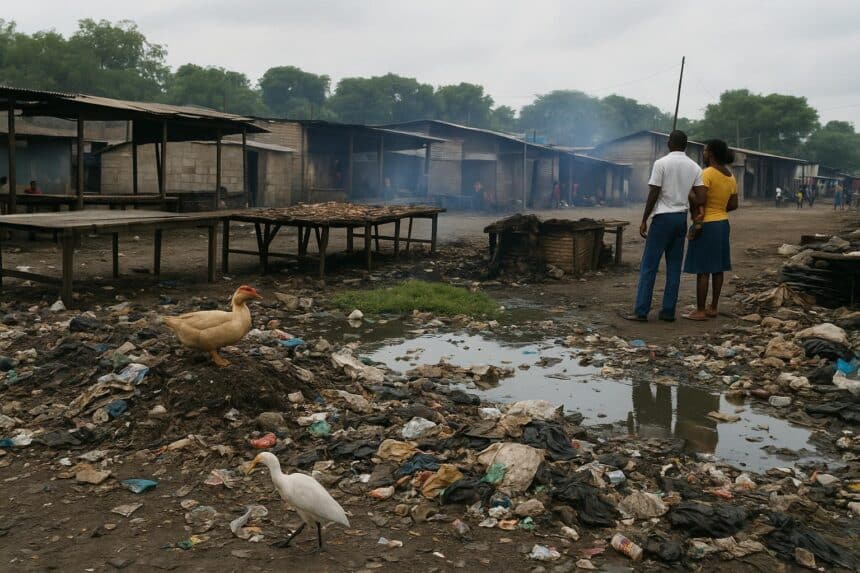A citywide challenge begins
From 20 September to 20 December, Pointe-Noire will hum with brooms, paintbrushes and recycling sacks as residents compete in the “Quartier Propre” challenge, a citywide contest created by Fondation Congo Assistance, the General Directorate of Sanitation and city hall to crown the cleanest neighbourhood.
- A citywide challenge begins
- Civic duty over litter
- Why a clean city matters
- Scoring the six districts
- Prizes shaped by residents
- Youth lead the green brigades
- State backing and resources
- Grassroots committees in action
- Radio waves and hashtags
- Tracking the results
- Cleaner streets, stronger trade
- Foundation at the helm
- Countdown to the finale
- Everyday gestures matter
- Toward a national culture of cleanliness
- Community pride on display
- Beyond December checks
Civic duty over litter
Organisers insist the fight against litter cannot rely solely on municipal trucks or volunteer groups; every household, shopkeeper and school must help. By turning cleanliness into a friendly rivalry, they hope to transform a routine chore into a point of pride that lasts long after trophies are handed out.
Why a clean city matters
A cleaner street does more than please the eye. Health inspectors link uncollected waste to malaria and cholera outbreaks, while economists say tidy sidewalks attract investors and tourists to the oceanfront city. The contest therefore frames sanitation as both a public-health necessity and a lever for local prosperity.
Scoring the six districts
The six arrondissements start on equal footing. Monitoring teams from the sanitation directorate will visit each block unannounced, scoring drainage, waste sorting, street sweeping and green spaces. Points will be deducted for illegal dumps or stagnant water; bonuses will reward murals, flowerbeds and creative recycling repurposing household items.
Prizes shaped by residents
The neighbourhood finishing first will receive community bins, street lighting kits and a development grant, announced at a December ceremony expected to fill the Place de la République. Organisers emphasise the prize list was shaped by resident surveys requesting practical tools rather than one-off cash envelopes.
Youth lead the green brigades
Schools and youth associations occupy a special lane in the ranking. Each Friday, pupils will join ‘green brigades’, planting trees outside classrooms and documenting progress on social media. According to the education district, the initiative doubles as an open-air civic lesson and a training ground for tomorrow’s eco-entrepreneurs.
State backing and resources
Spokesperson Armel Ibata notes that Pointe-Noire produces significant daily waste; mobilising citizens, he argues, can ease pressure on municipal budgets and landfill space. His ministry therefore supplies extra collection trucks, fuel and protective gear during the contest, signalling state commitment to shared cleanliness goals.
Grassroots committees in action
Neighbourhood chiefs, church groups and market cooperatives form local committees tasked with daily check-ins. They keep scoreboards at busy crossroads, updating points with chalk so residents can follow the race in real time. Visible progress, say organisers, turns the abstract idea of hygiene into something neighbors can celebrate together.
Radio waves and hashtags
Local radio stations broadcast morning reminders, while a dedicated hashtag #QuartierProprePN invites before-and-after photos. The city hall communication unit promises weekly live streams featuring tips on composting and mosquito control. By blending offline sweeps with digital storytelling, the campaign hopes to capture the attention of a mobile-first generation.
Tracking the results
At the contest’s end, sanitation officers will compare household waste volumes with mid-September baselines gathered before the launch. Early pilot runs in Mongo-Mpoukou reportedly reduced gutter blockages. Though figures are still being verified, officials say active participation can translate into quieter drains and fewer flood alerts during heavy rains.
Cleaner streets, stronger trade
Clean corridors could also boost petty trade. Vendors often complain that customers avoid stands near overflowing bins. If streets stay tidy for three months, the market federation predicts longer foot traffic hours and fresher produce displays, reinforcing the link between environmental stewardship and everyday livelihoods.
Foundation at the helm
Created by First Lady Antoinette Sassou Nguesso, Fondation Congo Assistance leads logistics, supplying gloves, rakes and water for volunteer shifts. Director Mireille Malonga says the initiative aligns with the foundation’s broader mission of social welfare through concrete actions. “A healthy setting is the first step toward human dignity,” she explains.
Countdown to the finale
Weekly progress reviews will be published every Saturday until mid-December. Judges will then deliberate before the grand finale slated for 20 December at Place de la République. Music groups and student choirs are booked to turn the prize-giving into a festive evening open to all residents.
Everyday gestures matter
Households are urged to sort organic waste into covered pits, keep plastics aside for collection days, sweep frontage areas at dawn and avoid pouring oil into drains. The mayor’s office reminds people that small, regular gestures, multiplied across six arrondissements, add up to measurable environmental change.
Toward a national culture of cleanliness
Organisers say the contest is only a start. Lessons learned in Pointe-Noire could inform similar programmes in Brazzaville’s nine arrondissements next year. By institutionalising friendly competition, authorities hope to cultivate a national culture of cleanliness that gradually reduces waste management costs and improves public health indicators.
Community pride on display
For many residents, the real reward lies not in material prizes but in the shared sense of responsibility blooming along freshly painted walls. “When visitors see our streets shine, they respect us more,” says seamstress Clarisse Ndinga, broom in hand. “We are showing the best of Pointe-Noire.”
Beyond December checks
After winners are announced, municipal teams plan quarterly inspection tours to ensure standards hold, preventing the initiative from fading into memory.






















